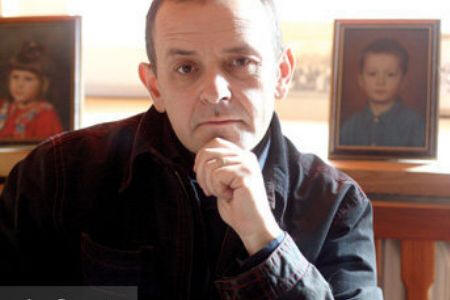'Persecution of revisionists
Holocaust denier death, Mossad linked'
Sun Aug 22, 2010 7:8PM

Dariusz Ratajczak
American writer JP Bellinger dose not rule out the the involvement of
Israeli spy agency, Mossad, in the tragic death of a Polish historian, who
was researching on the Holocaust.
Dariusz Ratajczak, a former professor at the University of Opole, was found dead in a car parked near a shopping center in Opole on June 11, 2010.
Forensic reports indicated that the body was in the car for nearly two weeks, but was in an advanced state of decay, suggesting that it was moved to car long after Ratajczak's death.
"After being questioned, a number of witnesses told the police that the car had only recently been parked there," Bellinger wrote in his article.
"Professor Ratajczak's death was ruled a 'suicide,' but skeptical people, perhaps bearing in mind the recent arrest of a Mossad assassin operating in Poland, are asking how a person in an advanced staged of composition was able to drive to a public parking lot and park a car?" he inquired.
He was referring to Uri Brodsky, Mossad agent accused of helping fake a German passport that was used by one of the members of a hit squad involved in the killing of Mahmoud al-Mabhouh, a senior Hamas commander, in a Dubai hotel in January.
Bellinger went on to say that Ratajczak's troubles began with the publication of his booklet, "Dangerous Topics," in March 1999 for which he was convicted of Holocaust denial in Poland.
"What possesses greater intrinsic value? Maintaining the mainstream version of the Holocaust at any cost or the life of a single human being whose only offence was to engage in historical research in a quest for the truth?"
Ratajczak believed it was not possible to kill millions of people in the Nazi gas chambers -- a view that provoked a firestorm of criticism among his contemporaries and Israelis lobbies.
Michael Sobelman, the spokesman the Israeli Embassy in Poland, accused Ratajczak of anti-Semitism and expressed "surprise" that "such a man works at a Polish university."
Sobelman's comment preceded Ratajczak's expulsion from the University of Opole.
Ratajczak believed that charge of anti-Semitism had become a sort of exceptionally brutal weapon, which the "establishment" uses ruthlessly against independent thinking men.
"What hurts me most is that I found myself in a group of historians who have been muzzled. After all, please see: from 45 years to now the number of Jews murdered in Auschwitz-Birkenau has dropped from six million to less than one million. It's official data. Indeed, even if they had killed one man, that would be a tragedy. But how is it that some historians may legitimately question the numbers of the Holocaust, and others can not? How is it that some people can reduce the six million to less than a million and nothing bad is happening to them? How is it that some people are not allowed to examine this subject and even be wrong, while other historians are allowed all this?" Ratajczak commented.
Bellinger says disturbing news of Ratajczak's death shocked some traditionalist and patriotic organizations in Poland, and concludes by asking, "Is questioning the holocaust, or holocaust 'denial' of more intrinsic worth than the life of any human being?"
JR/MMN